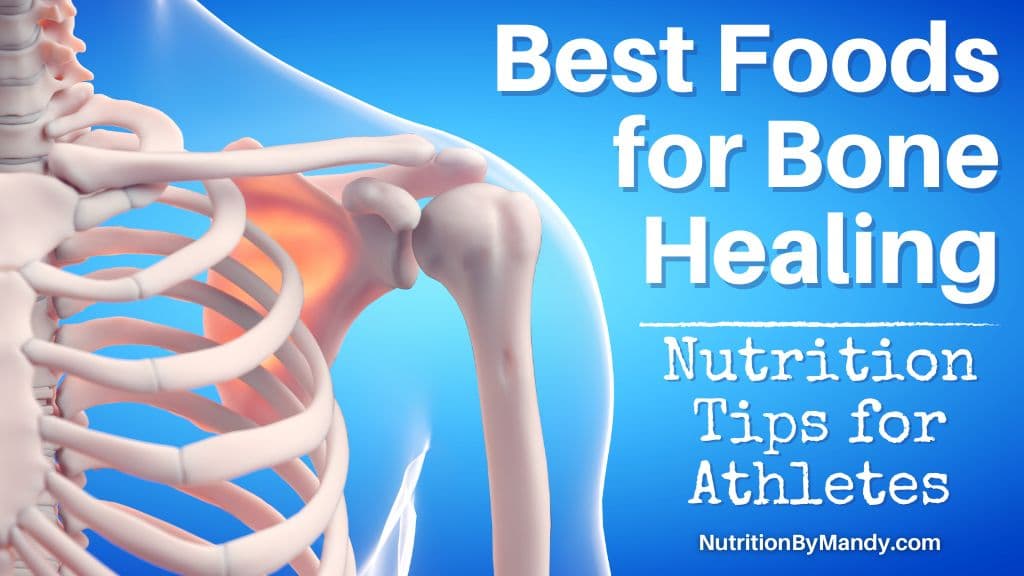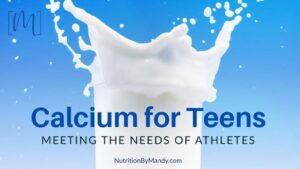Last Updated on May 3, 2025 by Mandy Tyler, M.Ed., RD, CSSD, LD
Best Foods for Bone Healing: Nutrition Tips for Athletes
When an athlete fractures a bone, they commonly wonder what foods they should eat to support their recovery.
Let’s take a look at key nutrients that are important for bone health. Then we will explore the best foods for bone healing that athletes can include in their recovery meal plan.
Best Foods for Bone Healing: Key Vitamins and Minerals
There are several vitamins and minerals that play an important role in bone health, including: calcium, Vitamin D, Vitamin K2, and magnesium.
When recovering from a bone fracture, including a variety of food items rich in these nutrients can help support the athlete’s nutrition needs.
Calcium-Rich Foods for Bone Healing
Calcium is an important mineral that is necessary for optimal bone health. It provides the structural component for building strong bones (1).
The recommended dietary allowance (RDA) for calcium varies based on an athlete’s age (1).
- Children and teens, 9-18 years: 1,300 mg/day
- Adults, 19-50 years: 1,000 mg/day
However, it is commonly recommended for athletes at risk of low bone mineral density to consume 1,500 mg of calcium/day to optimize bone health (2, 3).

Food Sources of Calcium
Calcium can be obtained in the diet from a variety of sources, including (1).
- Milk, yogurt, cheese, cottage cheese
- Calcium-fortified orange juice and plant-based milks
- Calcium-fortified breakfast cereals and other foods
- Tofu, soybeans
- Broccoli, kale, Chinese cabbage
- Canned sardines and salmon (with bones)
The chart below provides a point of reference for the amount of calcium in a variety of foods and beverages (4).
| Food / Drink | Amount of Calcium |
| 1-cup low-fat milk | 310 mg |
| 1-cup ultra-filtered milk | 401 mg |
| 1-cup non-fat Greek Yogurt | 272 mg |
| 1-cup low-fat cottage cheese | 227 mg |
| 1-cup calcium fortified orange juice | 349 mg |
| 3-oz salmon, pink, canned with bones | 183 mg |
| 1-cup raw broccoli | 35 mg |
In order to meet their daily calcium needs, athletes should aim to consume several servings of calcium-rich foods each day (5).
If athletes are not consuming adequate calcium in their diet, they should visit with a sports dietitian nutritionist. The dietitian can provide recommendations for increasing calcium intake as well as guidance on supplementation if needed (5).
Vitamin D for Bone Healing
In addition to calcium, Vitamin D is necessary for optimal bone health. Vitamin D has many important roles in the body, including promoting the absorption and utilization of calcium (6, 7).
Vitamin D is a fat-soluble vitamin the body can naturally produce when the skin is exposed to UV sunlight.
However, numerous factors can limit the exposure of the skin to UV rays, such as the use of sunscreen and wearing protective clothing when outdoors, which will decrease the skin’s production of Vitamin D (8).

Foods Containing Vitamin D
Vitamin D also can be obtained from food in the diet, including (5, 6):
- Milk fortified with Vitamin D
- Fortified plant-based milks
- Eggs (particularly the yolk)
- Fortified breakfast cereals
- Cod liver oil, trout, salmon
- Mushrooms exposed to UV light
The RDA for Vitamin D for children, teens, and adults (ages 1-50) years is 600 IU (15 mcg) per day (6).
Given the important role Vitamin D plays with bone health, athletes should include a variety of Vitamin-D rich foods in their meal plan.
Vitamin D Supplementation for Bone Health
If an athlete fractures a bone, I recommend requesting their physician test the Vitamin D level in their blood. If deficient in Vitamin D, an appropriate plan for supplementation can be determined.
Often supplementation along with the consumption of Vitamin D-rich foods will be necessary to correct a Vitamin D deficiency (8).
Vitamin K for Bone Health
Vitamin K is another fat-soluble vitamin that plays an important role in the formation of healthy bones (9).
There are two types of vitamin K (K1 and K2), which have different functions in the body. Vitamin K1 is essential for blood clotting, while Vitamin K2 is important for bone health (10).
Vitamin K2 is needed to activate the hormone osteocalcin in the body. Once osteocalcin is activated it can then bind calcium and form strong bones (10).
Foods Containing Vitamin K2
The best food sources of Vitamin K2 are fermented foods and animal-based foods. This is because Vitamin K2 is mainly produced by bacteria. The body can also naturally produce some forms of Vitamin K2 within the gut (9).
Foods containing Vitamin K2 that athletes can add to their meal plan include (9, 11):
- Chicken
- Pork
- Beef
- Cheese
- Egg yolk
- Fermented foods
- Natto (Japanese food made with fermented soybeans)
Magnesium for Bone Health
Magnesium is a mineral that has many essential roles in the body. It is necessary for energy production, muscle contraction, and nerve function.
In addition, magnesium is involved in the formation of DNA and RNA, as well as the development of healthy bones (12).
The majority of magnesium in the body (~60%) is stored within the bones. A magnesium deficiency can impact the structure and formation of bone cells, leading to a reduction in bone stiffness (13).
Adequate magnesium is necessary for the release and function of parathyroid hormone as well as the synthesis and activation of Vitamin D in the body (13, 14).
Parathyroid hormone and Vitamin D are both necessary for the maintenance of calcium levels in the body. Thus, a magnesium deficiency can disrupt calcium homeostasis and negatively impact bone formation (13, 14).
Magnesium-Rich Foods for Bone Health
Magnesium-rich foods that athletes can consume in their meals and snacks following a bone fracture include (12).
- Whole grains
- Avocados
- Green leafy vegetables
- Nuts and seeds
- Beans and legumes
- Fortified breakfast cereals
Foods containing magnesium also provide fiber, vitamins, minerals, and antioxidants. Thus, these foods are good options to support the overall health and nutrition needs of injured athletes.

Best Foods for Bone Healing: Protein
In addition to vitamins and minerals, it is important for athletes to consume adequate protein when recovering from a bone fracture.
When an athlete breaks a bone, the injured limb is immobilized to allow for healing. In addition, the athlete’s activity level decreases following an injury. The combination of reduced physical activity and immobilization can lead to a loss of muscle mass, strength, and function (15).
To help minimize the amount of muscle loss that occurs, injured athletes are encouraged to eat protein with meals and snacks spread throughout the day.
Spread Protein Intake Throughout the Day
When protein is consumed at a meal or snack, it sends a signal to the body to increase muscle protein synthesis (growth).
Thus, spreading protein intake throughout the day can optimize muscle protein growth and may help reduce the amount of muscle loss that occurs (15, 16).
In regard to amount, athletes should aim for at least 0.25-0.3 g of protein/kg of body weight at each eating occasion. This calculates to be in the range of 20-40 grams of protein depending upon the size of the athlete (15, 16, 17).
Protein Sources for Athletes
There are numerous ways that injured athletes can add protein to their meal plan, including:
- Eggs
- Greek yogurt
- Cottage cheese
- String cheese, sliced cheese
- Low-fat milk or ultra-filtered, high-protein milk
- Chicken, turkey, lean cuts of beef and pork, seafood
- Nuts and nut butters
- Soy milk, soy yogurt, tofu
- Edamame, beans, lentils, hummus, quinoa
I find most athletes do well with the protein intake at lunch and dinner. However, injured athletes should ensure they also include adequate protein with breakfast as well as with an evening snack before bed (15).

Best Foods for Bone Healing: Meal and Snack Ideas
Putting this all together, here are a variety of meal and snack ideas that provide key nutrients that can support bone health.
- Greek yogurt and berries parfait with whole grain granola
- Cottage cheese with pineapple and chia seeds
- Fortified breakfast cereal with high-protein milk
- Fruit smoothie made with Greek yogurt, high-protein milk, mixed berries, and ground flaxseeds
- Scrambled eggs with spinach, shredded cheese, and sliced avocado, whole wheat toast, and calcium-fortified orange juice
- String cheese, beef jerky, and mixed nuts
- Hummus with whole grain pita chips and calcium-fortified soy milk
- Grilled ham and cheese sandwich on whole wheat bread with low-fat milk
- Chicken and cheese quesadilla (whole wheat tortilla) with guacamole
- Protein overnight oats made with Greek yogurt, high-protein milk, chia seeds, blueberries, and walnuts
Best Foods for Bone Healing: Nutrition Tips for Athletes
You are now set with ideas for the best foods for athletes to include in their meal plan when recovering from a broken bone.
By eating a well-balanced diet that contains a variety of nutrient-rich foods athletes can help support their recovery nutrition needs.
For additional sports nutrition tips for injuries, check out my blog on nutrition for concussions.
Join the Nutrition By Mandy Email List & Get a Free Athlete’s Grocery List
Click HERE to join the Nutrition By Mandy e-mail list. When you join you will receive a free athlete’s grocery list to print and take with you to the store.
About the Author
Mandy Tyler is a Sports Dietitian Nutritionist in the San Antonio, TX area. She is a Registered and Licensed Dietitian, a Board-Certified Specialist in Sports Dietetics, a Licensed Athletic Trainer, and is a Certified Exercise Physiologist through the American College of Sports Medicine. Mandy has experience working with athletes at the high school, collegiate, and professional levels. She believes the key to reaching one’s full potential, both in everyday life and in sports performance, relies on a healthy nutritional foundation.

If you are looking to take your performance to the next level, make sure to check out my new Sports Nutrition Game Day Guide. This downloadable guide is written to help athletes develop an individualized plan to achieve peak performance on game day.





